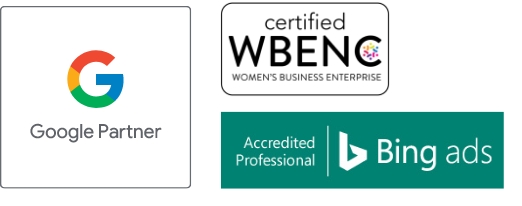
Why Paid Search Works for Healthcare Systems
Each day thousands of people turn to the internet for health information, and their search engine of choice is Google. How can you leverage this intel to attract and retain patients?
Given the volume of health information readily available on the internet, reaching your target audience through content marketing alone will not produce the short-term results you are looking for. Paid digital advertising, specifically paid search advertising, is the efficient, measurable channel you need to add to your healthcare marketing strategy.
Pay-per-click (PPC) or paid search ads can get your webpage into a top ad position on a search engine results page (SERP). The beauty of search ads is that your ad will appear to motivate searchers who are actively looking for information. This contrasts with display advertising that can be placed across a network of relevant websites in the hopes that it will interrupt a reader and gain a click.
Search advertising is a more targeted approach to online advertising. Imagine that anyone specifically searching for a dermatologist in your city sees your ad near the top of the search results page. Your information is in front of the right person at the right time, yielding targeted results.
PAID SEARCH RISKS FOR HEALTH SYSTEM MARKETERS
Working in healthcare marketing, you understand sensitive language restrictions. There are many terms you can use with an internal audience but not in a public forum. Google recently strengthened its restrictions on the use of sensitive language with a three-strikes policy. Using Google-defined sensitive words can snare your ads in their approval process and eventually get you banned altogether.
Competition on Google Ads is especially fierce for healthcare. Approximately one in 20 searches is healthcare-related, and all that traffic draws advertisers. One drawback of the heightened competition in the healthcare space is the cost of certain keywords. You might be competing with thousands of vendors for words like “hospital.” But, with the right keyword research/strategy in place, your budget can be better spent on more targeted – and less broad – search terms.
TIPS FOR BETTER PAID SEARCH MARKETING
You’ll want to gauge the cost of your PPC marketing by the results it gets. Use these tips to increase the ROI on your paid search efforts:
- Make Sure Your Keyword Strategy Is Well-Thought-Out: Bidding against the big guys for broad keywords like “hospital” is a good way to waste your budget or see minimal traction in your advertising. Spend the time upfront to outline your keyword strategy to make sure you’re utilizing targeted keywords with the right amount of competition and traffic.
- Tailor Your Digital Ads Mix to Your Goals: Paid search should be a large chunk of your digital ad spend (for reasons described in this article), but digital advertising works best when the right mix of channels is used. Brand awareness is an important piece of this puzzle and is most often achieved at a very low cost per click (CPC) by using display advertising in your channel mix.
- Watch Your Average Position and Impression Share: Impression share is important because it shows areas of opportunity. A higher impression share shows you’ve reached a large percentage of the total number of users you were eligible to reach. Lower impression share shows room for improvement. Monitoring your average position to keep it between 1 and 4 will ensure your ad appears on the first page in search results. If your average position is higher than 4, your ad quality, landing page, and keywords could be better.
- Get Your Contact Information Front and Center: You can’t anticipate the moment at which the user will be ready to make contact. Set up call, site link, and location extensions for all your campaigns. Also, be sure every landing page has clear calls to action so that a reader can easily contact you or gain more information.
- Communicate Clearly on Landing Pages: When a user clicks on your page, you want to keep them there. If the information is too thin or not relevant, they will be tempted to go on to the next search result. Google prioritizes content that is helpful and informational, so provide as much relevant information as possible in a clear, easy-to-read format.
Paid search is an easy way to drive traffic to your webpage and, when managed properly, can be a cost-effective part of your healthcare marketing strategy. To start planning your next digital campaign, contact LIGHTSTREAM today.
